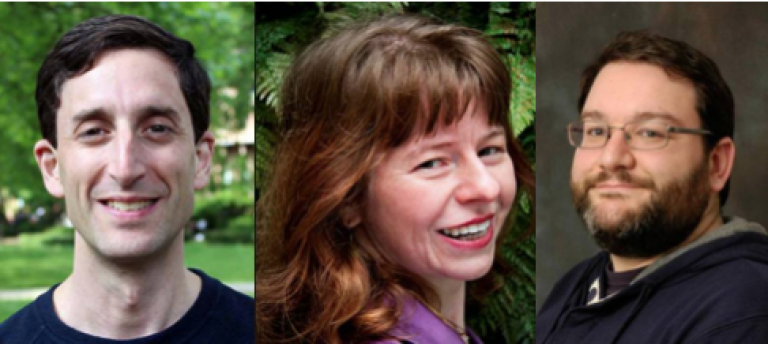Academic promotions for Prof Ilan Kelman, Prof Patty Kostkova, and Associate Prof Rob Wicks
28 June 2019
These are tremendous personal achievements for UCL IRDR academic staff, and well-deserved. Academic promotion is set against challenging criteria across research, teaching, impact, enterprise, external engagement and institutional citizenship.

We would like to congratulate:
Patty Kostkova who was promoted to Professor
Ilan Kelman who was promoted to Professor
Robert Wicks who was promoted to Associate Professor
It is good to see the excellent promotion track record of the IRDR and how strongly we feature in the MAPS promotion lists, as both internal and international recognition of all of our work, and that transdisciplinary careers in risk and disaster reduction can be recognised through promotion.
Professor Patty Kostkova is Professor in Digital Health. Her research investigates mobile digital health interventions, serious games for health and Big Data surveillance, early-warning and predictions of outbreaks and emergencies. In November 2018, she launched the UCL IRDR Centre for Digital Public Health in Emergencies (dPHE) bringing together experts from UCL and external stakeholders to lead on interdisciplinary research, training and policy advice to improve global public health through use of digital technologies and data systems. Her research on the ZIKA project led to a novel approach for early warning of mosquito populations in high risk areas calibrated by unique real-time mobile surveillance data. The GADSA project - the first game-based training app using data analytics to understand the impact of persuasive game technology on behaviour change to strengthen antibiotic stewardship in surgeons in Nigeria - is now being evaluated at the point of care in three hospital sites.
Professor Ilan Kelman is Professor of Risk, Resilience and Global Health, appointed 50:50 between IRDR and UCL Institute for Global Health. Prof Kelman’s research combines disaster and health research, including the integration of climate change challenges and opportunities. Two main case studies are priorities: island and archipelago communities, and the poles, so the Arctic and the Antarctic. Specific research questions relate to three main areas. First, disaster diplomacy and health diplomacy including the role of science diplomacy. Second, how climate change will impact physical, mental, and environmental health. Third, how to better connect sustainability and development topics, including health, disasters, and climate change. His 2018-2019 highlights include project grants awarded from the Research Council of Norway for “Norway-Russia Disaster Diplomacy in the High North and Arctic” and from the Wellcome Trust for “Lancet Countdown: Tracking progress on health and climate change”. Both projects link to future work focusing on bringing together different fields and disciplines while better connecting research, policy, and practice.
Dr Robert Wicks is Associate Professor in Space Weather Risk, appointed 50:50 to UCL IRDR and UCL Department of Space and Climate Physics. His work focuses on dynamic processes in outer space that impact the Earth. The Sun is the source of the solar wind, a supersonic flow of plasma that buffets the Earth. The changing pressure and magnetic field in the solar wind cause space weather, which includes increased radiation doses for satellites, astronauts and airline passengers, the brightening and enlarging of the aurora, surges in electrical current in the power grid, and interruption to radio communications and GNSS signals. Dr Wicks also works on satellite hardware projects. In 2018 he led a team of more than 100 scientists and engineers across the EU as PI of a €150M mission proposal to the European Space Agency (ESA), called Debye. He is also a Co-I in the ESA study of a space weather monitor mission called Lagrange.
See our full Academic staff profiles here.
 Close
Close

